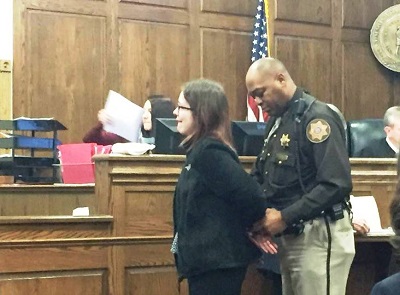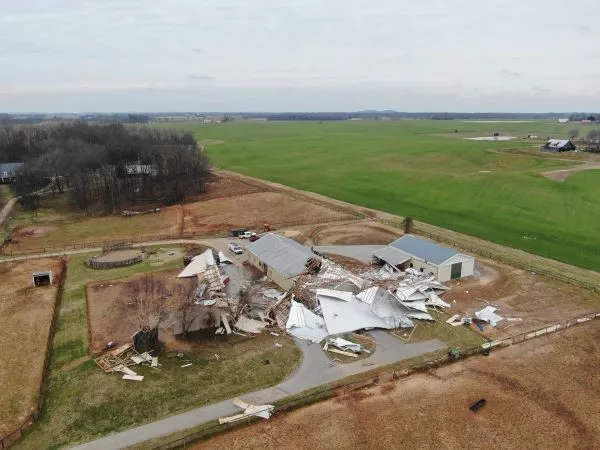
Two Kentucky teachers accused of having sex with students were sentenced to years in prison but were out in only months thanks to shock probation.
A Lexington Herald-Leader review of court records indicates they were two of dozens of people to receive little or no prison time despite facing these allegations.
But prosecutors and some defense lawyers question if some teachers accused of sexual misconduct with students are eligible for shock probation — early release after being sentenced — under state law.
Brandi Whitaker was a biology teacher at Madison Southern High School near Berea when she had sex with a 16-year-old male student. She pled guilty to an electronic communication charge and received a year in prison, according to court records.
She was out of jail in less than two months.
Courtney Davis, a former teacher at Muhlenberg County High School, was originally charged with third-degree rape, but pled guilty to the lesser charge of unlawful transaction with a minor and was sentenced to four years in prison, according to court records.
According to an October 2016 Muhlenberg Sheriff’s report, she told a deputy that she had been involved in a sexual relationship with a 16-year-old male student. She was out of jail in less than three months.
The Herald-Leader reviewed 194 cases from the Kentucky Education Professional Standards Board of teachers whose licenses were revoked, suspended or voluntarily suspended from 2016 to 2021. The newspaper obtained the records through the state’s Open Records Act.
Of the 118 teachers whose licenses were suspended or revoked due to sexual misconduct, 44 of those cases were never criminally prosecuted. Thirty-seven teachers accused of sexual misconduct with students had their charges dismissed, received probation or spent less than a year in prison. Davis and Whitaker received shock probation — or were released from prison early after they were sentenced.
They are two of the 37 cases where teachers accused of sexual misconduct involving students received little or no time. Prosecutors say it can be difficult to try sexual abuse cases involving teachers.
Teachers are college-educated and respected members of the community, making it even more difficult for a child to testify against them. If there is no physical evidence and the victim’s family or the victim don’t want to testify, those cases can be difficult to put in front of a jury.
“Juries want scientific evidence. They want DNA,” said Lou Anna Red Corn, Commonwealth Attorney for Fayette County, who has decades of experience prosecuting child sexual abuse cases. “In less than five percent of these cases there is physical evidence.”
Red Corn announced that she would retire from her position on Sept. 30.
Yet, prosecutors are tasked with proving beyond a reasonable doubt that a person is guilty. “As a result these cases are amended,” Red Corn said. “Some accountability is better than having the offender walk out of the courthouse free.”
But many prosecutors say Whitaker should not have been granted shock probation or early release under Kentucky law and that statues regarding what charges are eligible for shock probation under the law should be reviewed.
Whitaker was originally charged with rape and third-degree sodomy and first-degree sexual abuse. But those charges were dismissed and she pleaded guilty to using an electronic device to communicate with a minor, or using a cell phone or other device to communicate with a minor with the intention of having sex with that minor. It’s a class D felony under Kentucky law.
A grand jury alleged in an indictment that she used text messages and Facebook to contact the student. Court records indicated she had sexual contact with the 16-year-old twice over the summer of 2015.
She was sentenced in February 2017 and now-retired Madison Circuit Judge William Clouse granted shock probation in March of that year. Clouse declined to comment to the Herald-Leader. Additionally, as part of her plea agreement, Whitaker will be on the sex offender registry for 20 years. She surrendered her teaching certification in 2017, according to Education Professional Standard Board records.
Madison Assistant Commonwealth Attorney Jennifer Smith said under state law, the commission or attempted commission of a felony sexual offense is a violent offense. That includes using an electronic device to communicate with a minor.
A violent offender cannot get probation or suspension of sentence under Kentucky law. In Whitaker’s case, the judge granted shock probation although it was prohibited, Smith said. Whitaker pleaded guilty on the morning she was set to be tried. The victim was over the age of consent in Kentucky — 16.
Two women, similar accusations
Whitaker was charged as a person in a position of special trust or authority, and in Kentucky, that raises the age of consent to 18 instead of 16, which is why the crime was a felony. Smith said Whitaker’s defense was that the sexual activity took place outside the school year over the summer, so that the designation of a person in a position of trust did not apply. Smith argued Whitaker and the victim first came in contact when the victim was a student in her classroom during the school year. Smith said the judge said if she pleaded guilty, he would agree to shock probation. Smith said she did not appeal the shock probation because by the time the appeal was heard, Whitaker’s one year sentence would have been completed.
“It was a very unfortunate event,” Whitaker’s attorney James Baechtold said of the events that led to Whitaker’s prosecution. “There needs to be more teacher training. There needs to be more oversight and more guidance.” “With the advent of electronic media, these cases are prosecuted much more aggressively,” he said.
Various judicial circuits treat the violent sexual offenses differently, and shock probation is given in some counties more than others, said Baechtold.
Some of those violent sexual offenses include rape, sodomy, sexual abuse and using electronic means to induce a minor to engage in sexual or other prohibited activities. The statues outlining shock probation are confusing, he said. Smith said it’s difficult to know how many times shock probation has been granted in child sexual abuse cases. There are many places statewide where courts probate felons involved in violent crimes, including sex abuse, said Smith.
“Brandi Whitaker is the only case I can think of (among violent crime convictions as defined by state law) where probation has been granted. She is the absolute exception,” Smith said. Davis, who eventually pleaded guilty to unlawful transaction with a minor second degree, was likely eligible for shock probation under state law.
Davis pled guilty to unlawful transaction with a minor second degree, which is a class D felony. She was sentenced to four years in March 2017. She was granted shock probation in June 2017, court records show. She was originally charged with third-degree rape. She had sex with a 16-year-old male, according to court records.
Davis, a teacher at East Campus High School in Greenville, admitted to being in a sexual relationship with the student, according to a Muhlenburg County Sheriff’s report. Davis’ supervision by the state ended June 16, 2022, according to online state records. Davis’ attorney Clay Wilkey declined to comment. Davis also declined to comment through her attorney.
Muhlenberg Commonwealth’s Attorney Clayton Adams said he took his position after the case was prosecuted. The former commonwealth’s attorney could not be reached for comment but court records said that office did not oppose shock probation.
Second-degree unlawful transaction with a minor is not one of the offenses listed in Kentucky statutes as being prohibited from receiving probation, including shock probation. However, a separate section of Kentucky law that outlines what charges are eligible for probation excludes, “A person who occupies a position of special trust and commits an act of substantial sexual conduct.”
Teachers are considered a person who occupies a position of special trust. Baechtold said it’s time the Kentucky General Assembly revisit the issue of shock probation and sex crimes to make it clear who is eligible for shock probation and who is not. All of that information should be included in one chapter of the criminal codes, he said.
Other teachers accused of sex crimes denied shock probation
Two other teachers who have been charged with sex crimes related to students have been denied shock probation. Jordan Chapman was accused of sending sexually explicit photos and a video to a 17-year-old former student in December 2018. He taught at Madison Southern High School in Berea from 2015 to 2018, where he allegedly met the student.
Chapman later moved to Grayson County Schools where he was employed as a high school teacher. He pled guilty in April 2022 to using electronic means to procure a minor and sexual abuse and was sentenced to one year. Under the law, both are considered violent sexual offenses and are not be eligible for shock probation, prosecutors said. Lawyers for Chapman filed a motion asking for shock probation in early July. Smith’s office fought Chapman’s early release, saying he was not eligible under the statutes.
A Madison Circuit Court judge agreed and denied Chapman’s shock probation request on July 25, records show. Chapman’s teaching license was permanently revoked in July, according to Kentucky Education Professional Standards Board officials. At least one teacher in the 194 cases the Herald-Leader reviewed was granted shock probation but had to return to jail after prosecutors questioned his release.
In 2018, Darvin Andy Crouch, a Bath County Middle School teacher, was sentenced to five years after pleading guilty to five counts of first-degree sexual abuse, a violent sexual offense. Crouch was accused of having a sexual relationship with a 15-year-old student. He asked for and was granted shock probation on April 22, 2019. Prosecutors objected, court documents show. Crouch wasn’t eligible for shock probation because he committed a violent criminal offense, prosecutors argued.
Any individual who is considered a violent offender pursuant to KRS 439.3401 is not eligible for shock probation. A violent offender is ‘any person who has been convicted of or plead guilty’ to ‘the commission or attempted commission of a felony sexual offense described in KRS Chapter 510,’” wrote Ashton McKenzie, an assistant commonwealth attorney in an appeal of Crouch’s shock probation.
On April 26, Crouch’s shock probation was overturned, according to court records. He was ordered to return to jail. McKenzie did not return calls asking for comment. Crouch, through his lawyers, did not respond to requests for comment.
(Photo: Brandi Whitaker, a former Madison County teacher, pled guilty to unlawful use of electronic device to induce a minor in 2017. She was given shock probation that same year. Courtesy of WKYT)
By Valerie Honeycutt Spears and Beth Musgrave, the Lexington Herald-Leader








